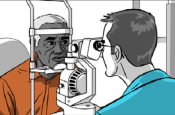 No CPD Points
No CPD Points
This course provides optometrists with information on managing patients presenting with acute onset symptoms in two key areas: sudden loss of vision and the painful red eye. It covers the presentation of each condition, what to look for during examination, differential diagnosis, referral steps, further clinical management and any red flag symptoms requiring immediate referral.
Topics: Ischaemic, Optic neuropathy, Retinal artery occlusion, Retinal vein occlusion, Haemorrhage, Ameurosis fugax, Posterior eye, Referral, Treatment, Acute, Anterior uveitis, Glaucoma, Keratitis, CLARE, Contact lenses, Scleritis, Trauma, Cellulitis, Referral, Anterior eye, Ocular disease.
Areas of interest: MECS, Anterior eye conditions and acute presentations, Newly qualified, Acute presentation series.
 No CPD Points
No CPD Points
Topics: Papilloedema, Optic neuritis, Pupils, Visual fields, Palsy, Nerve, Diplopia, Acute, Treatment, Referral, Retinal detachment, Giant cell arteritis, Trauma, Ischaemic, TIA.
Area of interest: MECS, Anterior eye conditions and acute presentations, Newly qualified, Acute presentation series.
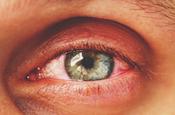
No CPD Points
Domains: Clinical practice, Professionalism
![]()
![]()
This lecture, by consultant ophthalmologist Damian Lake, covers different acute red eye conditions particularly in contact lens wearers. It discusses the management of both those that can be treated in practice, and others, such as infective causes, where urgent referral to the Hospital Eye Service is required.
Topics: Contact lenses, Ulcers, Microbial keratitis, Ocular allergy, Viral, Bacterial, Fungal, Allergic, Infiltrate, Hygiene, Infection, Acanthamoeba, Abrasion.
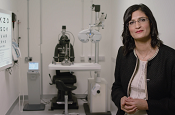
No CPD Points
![]()
![]()
In this programme, experts look at how to adapt the routine eye check when examining elderly patients including communication, ocular examination and refraction. It provides guidance on techniques to use and how best to modify an examination to ensure that elderly patients get the highest level of care and their individual needs are addressed.
Topics: Communication, Ocular examination, Refraction, Binocular vision, Charts, Pupils, Visual fields, Legal, Visual assessment, Retinoscopy, Ophthalmoscopy, LogMAR, Contrast sensitivity, Lighting.
No CPD Points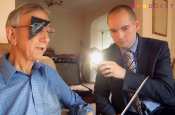
![]()
![]()
Using expert advice and insights, this course guides optometrists through all aspects of carrying out domiciliary eye examinations, including useful facts and tips on planning and arranging visits, effective communication, legal requirements, necessary equipment and adapting clinical techniques to meet the needs of patients being examined in their own homes or care homes.
Topics: Legal, Care home, Dementia, Communication, Safeguarding, Lighting, Disability, Record keeping, Visual assessment, Equipment, GOS.

No CPD Points
![]()
![]()
This course takes optometrists into the world of their older patients, helping them to understand some of the challenges of living with changing vision, covering topics such as lighting, driving, mobility and nutrition.
Topics: Ageing eye, Lighting, Falls, Mobility, Nutrition, Diet, Low vision, Driving, AREDS, Psychology, Vision loss, Supplements, Visual impairment.
 No CPD Points
No CPD Points
![]()
![]()
A comprehensive overview of Charles Bonnet syndrome, based on the latest research. Includes advice on identifying the condition, addressing the topic with patients, appropriate management steps and what can be done to help sufferers.
Topics: AMD, Ageing eye, Low vision, Dementia, Hallucinations, Psychology, Vision loss, Dominic ffytche, Visual impairment.
No CPD Points
![]()
![]()
This programme provides guidance on the challenges in communication that optometrists may face and strategies that can be used to improve their services to older patients.
Topics: Vulnerable adults, Dementia, Disability, Verbal, Questions, Language, Advice, Recommendations, Ageing, Psychological, Anxiety, Cognitive.
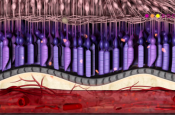 No CPD Points
No CPD Points
This programme looks at the effects of ageing on a normal, healthy eye, including aspects of anatomy and visual performance. It also considers the identification, investigation and management of common ocular abnormalities that may be encountered in everyday practice in older patients.
Topics: Visual assessment, Anterior eye, Posterior eye, Visual fields, Contrast sensitivity, Referral, Fundus, Dry eye, Glaucoma, Cataract, AMD, Visual acuity, Colour vision.
 No CPD Points
No CPD Points
![]()
![]()
This programme updates and refreshes optometrists' understanding of common age-related systemic diseases and their impact on the eye. It includes guidance on the effects of various medications, appropriate investigation and patient management.
Topics: Diabetes, Hypertension, Neurological, Inflammatory, Arthritis, Medication, Heart disease, Malignant, Parkinsons, Vascular, Smoking, Dementia.
 No CPD Points
No CPD Points
![]()
![]()
This programme looks at the various refractive correction options available for presbyopes. Through a mix of filmed patient scenarios and expert advice four areas are considered: spectacle frames and lenses, contact lenses, correction with intra-ocular lenses, and managing presbyopic patients following refractive laser surgery.
Topics: Ageing eye, Contact lenses, Spectacles, Dispensing, Refractive surgery, Intraocular lenses, Multifocal, Lenses, Tints, Presbyope, Frames, IOLs, Driving, Cataract.
 No CPD Points
No CPD Points
Professor Dave Elliott of the University of Bradford explains the link between vision and falls and the important role optometrists can play in helping to prevent falls in older patients.
Topics: Falls, Spectacles, Lenses, Dispensing, Mobility, Lighting, Multifocals, Low vision, Ageing Eye, Vision loss, Cataract.
 No CPD Points
No CPD Points
Domains: Clinical practice, Professionalism
![]()
![]()
The last module in the Ageing Eye series discusses low vision assessment for elderly patients. Part one of the module reviews the assessment of the visually impaired patient, offers essential information on magnification and vision assessment techniques, and reviews currently available low vision aids.
Topics: Visual assessment, Ocular examination, Charts, Optics, Visual impairment, Specialist charts, LogMAR, Magnification, Low vision aids, Acuity reserve.
 No CPD Points
No CPD Points
Domains: Clinical practice, Professionalism
![]()
![]()
The last module in the Ageing Eye Series discusses low vision assessment for elderly patients. Part two of the module reviews four patient cases. For each patient, you will see an expert panel discussion and a management plan for reference.
Topics: Communication, Mental health, Field loss, Depression, Electronic aids, Management plans, Inter-professional, Mobility.
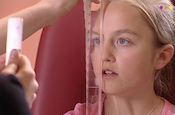
No CPD Points
Domains: Clinical practice, Communication
![]()
![]()
Binocular Vision provides a step-by-step practical guide to the various techniques required in practice to assess the binocular status of patients. The course also explores the appropriate management for a broad range of anomalies.
Topics: Children, Orthoptics, Amblyopia, Strabismus, Squint, Incommitent, Commitent, Exercises, Motility, Heterophoria, Stereopsis, Prisms, Newly qualified.
Area of interest: MECS

No CPD Points
Domains: Communication, Clinical practice
![]()
![]()
This recorded webinar with Mr Neil Retallic presents key findings from recent contact lens research published in the BCLA Contact Lens Evidence Based Academic Reports (CLEAR) and discusses how it can help shape contact lens practice. The presentation provides clinical pearls on how to best relate to contact lens wearer’s individual needs and take a patient centric evidence-based approach, to maximise success with contact lens wear.
Topics: Soft, RGP multifocal, Presbyopia, Fitting, Aftercare, Evidence-based, CLD, Complications, BCLA, Toric.

No CPD Points
Domains: Clinical practice
![]()
This recorded webinar, hosted by Consultant Ophthalmic Surgeon Raman Malhotra, will help optometrists to identify and manage commonly occurring suspicious eyelid conditions. It will cover both benign and malignant eyelid lesions as well as discuss the features, diagnosis, management and referral of the conditions by community optometrists. At the end of the webinar, Mr Malhotra answers questions raised during the lecture.
Topics: Lids, Malignant, Benign, BCC, Carcinoma, Oncology, Meibomian, Tumour, Squamous cell, Melanoma, Chalazion, Molluscum, Naevus, Papilloma, Xanthelasma.
 No CPD Points
No CPD Points
Communication skills are a vital part of your clinical practice. This course is a filmed workshop using skilled actors with an audience of real optometrists. It introduces different aspects of clinical communication and demonstrates how developing your knowledge and skills in communicating effectively with your patients will help you run a successful and safe optometric practice.
Topics: Advice, Verbal, Referral, Anxiety, Complaints, Questions, Language, Recommendations, Psychology.
 No CPD Points
No CPD Points
The first module of the contact lenses series covers the core skills required to examine patients to assess their suitability for contact lenses, to fit a range of RGP and soft lenses and to conduct successful patient aftercare. This programme is particularly suitable for those new or returning to contact lens fitting.
Topics: Contact lenses, Slit lamp, RGP, Rigid gas permeable, Soft, Tear assessment, Dry eye, Record keeping, Grading scales, Keratometry.
 No CPD Points
No CPD Points
Domains: Clinical practice, Communication
![]()
![]()
The programme is split into two parts. This first part covers the skills required to examine and fit astigmatic patients with soft contact lenses, including toric fitting tips and problem solving.
Topics: Astigmatism, Soft lenses, Slit lamp, Toric, Aftercare, Keratometry, Contact lenses, Prism ballast, Stabilisation.